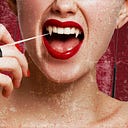Reflecting on Mirrors: So Vein
The vampires of Eastern European folklore were not typically irresistible sexual beings. Rather, they were often shambling corpses; a zombie that retained some intelligence. They could be decayed and definitely unkempt.
Not taking mirror selfies, is what I’m saying.
But did traditional vampires lack a reflection?
No.
The lack of reflection was an invention of fiction authors. The first time I know of it being used as a device is in Alexander Dumas’ The Vampire Of The Carpathian Mountains; though it’s certainly more well-known in Bram Stoker’s Dracula (you may have heard of it). An absent reflection has been a trope of vampire tales ever since. It’s a double-reverse-Medusa: Medusa could only be safely fought while showing up a mirror; Dracula could only be safely identified by not showing up in a mirror.
But it’s an odd feature , innit? It doesn’t exactly constrain a vampire to not have a reflection, aside from needing someone else to tell you when you’ve got a dangling booger.
There’s a perfectly illogical explanation for this trait passed down from a hybrid of folklore and fictional ret-cons to explain eerie traits: Only beings with souls cast reflections; vampires have no soul; ergo vampires don’t appear in mirrors. I call this an illogical explanation because this reasoning fails to explain why other things that lack souls — corpses, airplanes, oven mitts — all show up in a mirror.
There’s a more complicated explanation that I’ve never seen spelled out, though it’s certainly derived from the available texts in a roundabout way: See, Dracula doesn’t actually turn into a bat or a mist or a wolf. He makes us _believe_ he has done all these things because he has the power of suggestion and hypnosis. Vampires are not even physical humanoids; we simply _think_ we can see them before us. But the mirror is not fooled by Dracula’s mind games; it shows that he isn’t there at all… at least not in the solid, corporeal sense we perceive him. This is consistent with a simpler view of the fictional vampire’s powers: rather than being able to do everything, he can do ONE thing really well — which is to mesmerize his targets.
And yet another explanation requires us to return to folklore — in some superstitions, when one sells her soul to the devil, the devil removes her shadow. In this way, the shadow, like reflections, is considered a physical object that can removed.
Oh, and Dracula casts no shadow either. Funny, that.
Yeah, but why tho?
Why, exactly, remove a reflection or a shadow? It doesn’t seem like that big a problem considering the incredible, if Satanic, power one gets in return. I’d like to offer a possibility suggested to me by screenwriter and performer Dave Sheridan: anyone who is so arrogant to think they deserve to live forever, should be robbed of the pleasure of indulging themselves in their own ageless beauty. Yes, you’ll have eternal youth, but you won’t be able to see it.
I’m a fan of combining Dave’s outlook with the folklore surrounding selling one’s soul. The former provides the reason, the latter provides the mechanism.
Incidentally, Dave Sheridan has no memory whatsoever of this conversation he had with me. That’s because I used my vampiric power of suggestion to hypnotize him into believing I was bottle of Jack Daniel’s Tennessee Honey. Sheridan is a lush for JD Honey.
Is the mirror gag a useful trope or outdated? Is my theory on hypnosis/reflection sound and, more importantly, did anyone write it down before me?
Toothpickings is a blog that you can read. It is generally about vampires.
Image credits: Shutterstock, Doug Mills/New York Times, Terrell Bohm
